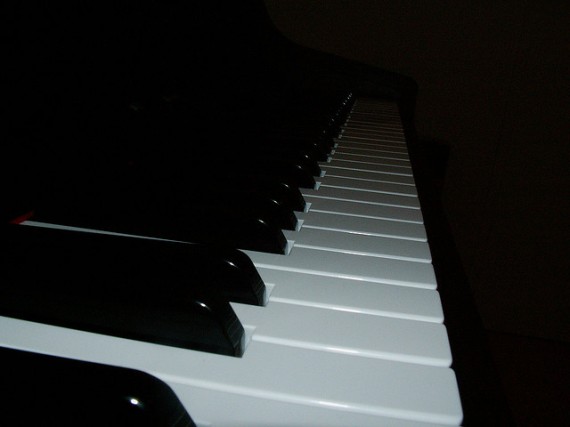
1.
 Watching Eugenio Mira’s thriller Grand Piano last month, I finally realized why my piano career ended in a disastrous recital at a local church and not at the Met. Had my piano teacher scrawled, “Play one wrong note and you die” across my sheet music in addition to her helpful but not particularly inspirational fingering suggestions, I probably would have practiced more diligently.
Watching Eugenio Mira’s thriller Grand Piano last month, I finally realized why my piano career ended in a disastrous recital at a local church and not at the Met. Had my piano teacher scrawled, “Play one wrong note and you die” across my sheet music in addition to her helpful but not particularly inspirational fingering suggestions, I probably would have practiced more diligently.
Such is the minatory note that greets Grand Piano’s Tom Selznick (Elijah Wood) upon opening his scorebook during his comeback performance. (As if the written warning weren’t enough, Selznick’s mysterious tormentor, hidden in the auditorium with a sniper rifle, reinforces his message through an earpiece: “Come in late and it’ll be the last downbeat you ever play.”) It has been five years since Selznick has melted down while attempting his old teacher’s fiendishly difficult composition, “La Cinquette,” an “unplayable” piece that is the perfect accompaniment to an unwatchable movie.
As the skittish virtuoso begins to play “La Cinquette” and its lightning quick final four bars approach, the reason behind the villain’s obsession with perfection is revealed, at which point the antagonists dutifully report to the rafters to fight. Wouldn’t dueling pianos have made more sense?
I hate to ask too much of a movie in which a pianist texts for help while casually accompanying the orchestra, but Grand Piano had a potentially interesting conceit about the wrongheaded, nay pathological demand for artistic perfection. Predictably, the motivation turns out to be more material than aesthetic, and the facile moral of the story urges Selznick to embrace the amateur spirit: since the audience will never know if he makes a mistake or not, he resolves not to be such a perfectionist.
While the following three piano-themed books—Alan Rusbridger’s Play it Again, Thomas Bernhard’s The Loser and Murray Bail’s extraordinary The Voyage—are all inexplicably devoid of sniper rifles, they do present slightly more nuanced takes on perfection and its discontents.
2.
 In the memoir Play it Again, the Guardian newspaper’s editor Alan Rusbridger attempts to learn Chopin’s first Ballade, a piece that, while not as technically demanding as the mythical Cinquette, still poses its challenges. Notable among these is the “nightmare coda,” which, as Rusbridger tells us, “the best pianists in the world fear. It’s presto con fuoco — demonically fast — and syncopated.” In thriller-movie fashion, he refers to one challenging leap as a “trapeze of death,” though the stakes of making that leap are obviously lower than in Grand Piano. After all, to quote the review of an amateur concert in which Rusbridger participates, “It’s only really music critics and piano teachers who can’t abide the imperfect.”
In the memoir Play it Again, the Guardian newspaper’s editor Alan Rusbridger attempts to learn Chopin’s first Ballade, a piece that, while not as technically demanding as the mythical Cinquette, still poses its challenges. Notable among these is the “nightmare coda,” which, as Rusbridger tells us, “the best pianists in the world fear. It’s presto con fuoco — demonically fast — and syncopated.” In thriller-movie fashion, he refers to one challenging leap as a “trapeze of death,” though the stakes of making that leap are obviously lower than in Grand Piano. After all, to quote the review of an amateur concert in which Rusbridger participates, “It’s only really music critics and piano teachers who can’t abide the imperfect.”
Rusbridger categorizes his project as “part of a much broader experiment in how to use your time, how to relish — and revel in — being an amateur.” He has less time than most, especially during the period in question, which saw Rusbridger consumed by the paper’s work on the Wikileaks scoop, phone hacking scandals, and the European financial crisis. In the book’s best scene, he travels to Libya to help free a captured freelance reporter. Once in Tripoli, the longeurs of hostage negotiation provide the amateur with a rare opportunity to perform in public:
And so I sit down in Tripoli, in the middle of a civil war, on a ledge above an echoing and virtually deserted restaurant — with just the faintest hint of Frank Sinatra over the muzak system — and play the first few pages of the Chopin Ballade. I see a few faces craning up at me, but soon they go back to their scrambled eggs and grilled tomatoes.
At least the tomatoes stayed on the plates, which means he couldn’t have played all that badly.
The narrative line of Play it Again could be tighter, but there is something about the very capaciousness of Rusbridger’s diary — interview with pianists, scholars, and brain surgeons, monitoring the Twittersphere for Ballade recordings, endlessly debating over which piano to buy — that builds up the tension as he gets closer to playing the piece. On the eve of the performance, there is still a “whack-a-mole feeling to it all” that adds to the drama: “Just as I tidy up one corner of the piece another starts falling apart.”
Unsurprisingly then, Rusbridger takes heart in one pianist’s verdict that uncertainty only adds to the overall effect: “Perhaps this coda is never more exciting than when a few notes are missed.” In other words, Chopin’s piece, and especially the coda, benefits aesthetically from a certain thrilling imperfection. Rusbridger finds further support for this idea from the New Yorker music critic Alex Ross. Ross explains his theory that a “cult of precision” developed along with the classical music recording industry: an “emphasis on togetherness, on technical control” that made earlier recordings seem “sloppy, less controlled than we hear nowadays” and set an incredibly high bar for live performances. What could be achieved by splicing together takes in a studio cannot easily be reproduced at a concert. According to Ross, a welcome reaction has already begun to occur, a “loosening” of the restrictive pursuit of a “perfect performance” in favor of a more creative approach.
Within reason, that is. I doubt Ross would approve of the “creative” approach offered to Rusbridger by the Russian pianist Boris Berezovsky: “The pedal in Chopin…will help to cover up some things which normally without pedal would come sticking out. It helps to cover up mistakes and other stuff — so just put it on and enjoy.”
3.
 In The Loser, Thomas Bernhard dramatizes the depressing limits of technical perfection: that unbridgeable gap between virtuosity and genius. Whereas Rusbridger delights in the communal pleasures of amateurism, Bernhard delves into the merciless antagonism of artistic sublimity: strong characters devour weak ones, “piano artists” are superior to “repulsive” pianists and the genius of Glenn Gould’s “piano radicalism” exposes the mere virtuoso’s fundamental amateurism.
In The Loser, Thomas Bernhard dramatizes the depressing limits of technical perfection: that unbridgeable gap between virtuosity and genius. Whereas Rusbridger delights in the communal pleasures of amateurism, Bernhard delves into the merciless antagonism of artistic sublimity: strong characters devour weak ones, “piano artists” are superior to “repulsive” pianists and the genius of Glenn Gould’s “piano radicalism” exposes the mere virtuoso’s fundamental amateurism.
The novel is a paean to the humming wunderkind Glenn Gould, the Canadian who made his name with a recording of Bach’s Goldberg Variations at the age of twenty-two. In his brilliant practice sessions, he “interprets” for hours on end without mistake, playing, as Bernhard puts it, inglennuously. Such is the power of the strong artist: to become an adverb.
There’s a Nietzschean element to Bernhard’s Gould, misconstrued by “the whole world…as the absolute weakling of artists.” Gould is a “transcendent artist,” a “ruthless person toward himself” who has attained an “inhuman state” and possesses a “terrible…magnificence” that destroys lesser artists. In one incredible scene, Gould, an “athletic type” whose hunched posture at the piano belies his incredible strength, laboriously chops down an ash tree he claims is “obstruct[ing] his playing.” He doesn’t even think to ask the property’s owner: “If something is in our way we have to get rid of it…If we ask first we’re already so weakened that it’s bad for us, may even destroy us…”
The narrator and a man named Wertheimer, whom Gould genially dubs “the loser” immediately upon meeting him, are two promising pianists. They first hear Gould playing in Salzburg where they have all come to study with Vladimir Horowitz. The two are immediately and “fatally wounded” by Gould’s playing:
Glenn had played only a few bars and Wertheimer was already thinking about giving up…For a decade we study the instrument we have chosen for ourselves and then, after this arduous, more or less depressing decade, we hear a genius play a few bars and are washed up…
The two men react differently to the cruel revelation of their inescapable amateurishness. The narrator derives a perverse sense of strength from achieving a “thoroughly extraordinarily degree of perfection” and then giving it all up when confronted by the fact of Glenn Gould. By contrast, Wertheimer never could “admit his own failure.” An “unrelieved emulator,” he eventually hangs himself after playing the piano for two weeks non-stop while hosting a debauched party, his attempt to copy Gould by committing suicide by Bach. (In Bernhard’s slightly altered version of Gould’s death, the recluse suffers a stroke while at his piano.) The narrator’s analysis of his friend’s suicide reveals that the antagonistic language deployed throughout is not merely rhetorical:
Whereas the Goldberg Variations were composed for the sole purpose of helping an insomniac put up with the insomnia he had suffered from all his life, I thought, they killed Wertheimer.
To play inglennuously is to play fatally, at least to those few virtuosos who wish desperately to become adverbs themselves.
4.
 Murray Bail’s latest marvel, The Voyage, documents the aesthetic peril of perfection by focusing on the instrument rather than the player. Frank Delage is an Australian piano manufacturer who has developed an innovative new concert grand while “operating from a political, industrial and musical outpost, Sydney.” Delage comes to Europe to introduce his new model and its distinctive sound to “music-saturated” Vienna, a city awash in Bosendorfers, Bechsteins, Faziolis, and of course Steinways. Once there, he gets tangled up with the illustrious Von Schalla family — pursuing the mother and grand musical patron Amalia, pursued by the daughter Elisabeth and frequently waylaid by the boorish patriarch Konrad, who asks the inventor if he has “a small area in the back of your brain, allocated to ‘hopeless and impractical ideas.’”
Murray Bail’s latest marvel, The Voyage, documents the aesthetic peril of perfection by focusing on the instrument rather than the player. Frank Delage is an Australian piano manufacturer who has developed an innovative new concert grand while “operating from a political, industrial and musical outpost, Sydney.” Delage comes to Europe to introduce his new model and its distinctive sound to “music-saturated” Vienna, a city awash in Bosendorfers, Bechsteins, Faziolis, and of course Steinways. Once there, he gets tangled up with the illustrious Von Schalla family — pursuing the mother and grand musical patron Amalia, pursued by the daughter Elisabeth and frequently waylaid by the boorish patriarch Konrad, who asks the inventor if he has “a small area in the back of your brain, allocated to ‘hopeless and impractical ideas.’”
The titular “voyage” refers both to Delage’s largely unsuccessful Viennese adventure and his journey back to Australia on a container ship, where he is accompanied by Elisabeth, who lounges about their cabin in various states of undress eliciting the impressionistic, fragmented tale from her captor. (Not without a certain frisson that partially explains her rash decision to join him, she imagines Delage as a “raider [who] manages to escape with his plunder.”)
To try to sell his product in a place “stuffed full of pianos” is a bit like carrying coals to Newscastle, but Delage’s failure to export his piano goes deeper than problems of supply and demand. At one point, Delage gets an influential, splenetic critic to hear his new instrument. The critic is clearly struck by the invention, reflecting on it deeply before delivering his verdict in the middle of a crowded footpath as people are forced to walk around him, a marvelous little display of indifference to the public and its complacent opinions. His speech identifies the hidden flaw in the perfect instrument:
The sound of the Delage piano, he said, was too pure…it was a new sound, clean and precise…But he said it doesn’t allow for imperfections. A person playing a Delage would be exposed with every note…And that would be alright, except it was not a technical mistake, it showed a misunderstanding of art — he said ‘catastrophic misunderstanding’…As listeners, we actually want an imperfect result. It is human, and therefore closer to human understanding. Otherwise, it was beyond understanding. He finished by saying that whoever invented such a perfect piano would be just as unforgiving in life.
The piano reflects on the narrowness of its inventor, revealing an aesthetic as well as a moral failing. Delage’s European education, which begins to address both, entails nothing so much as seeing that “Pianos were not the only things that were complex.”
A trace of Bernhard can be heard in the rants against Vienna’s “spiritual and artistic exhaustion” and its creaking floorboards, the “loose joints of conservatism,” though The Voyage is Jamesian through and through: an ultra-fine comedy of manners that dramatizes the struggle between “New World ingenuity” and “worn-out, overdecorated Europe.” In a wonderfully understated phrase that captures how much the novel does with so little, Bail tells us that Delage returns from Europe “with a young woman from Vienna, and a slight change in personality.”
Delage’s guide and patron is not that young woman but her mother, Amalia von Schalla, who takes pity on the inept but hopeful salesman and the “dangerous instrument everyone here wants to run a mile away from.” The “alert, shining” Delage breaks through the sclerotic in Amalia, who is like
the Steinways, Bechsteins, Bosendorfers gathering dust in silent rooms in Vienna, their lids closed, like Europe itself, a place hardly able to breathe, a matter of raising the glossy black lids, waiting to release sounds.
Part of Amalia’s attraction for Delage stems from his particularly New World bad taste (quite distinct from the Old World bad taste on display in its ornate drawing rooms). Delage clowns for her, performing a “ridiculous trumpet fanfare with his mouth” when unveiling the one piano he has shipped over, which stands out because of its garish “nicotine brown, the color of a bantam rooster.” To demonstrate the superiority of his piano’s sound, Delage plays her a loud, improvised honkytonk tune, “hardly appropriate under the circumstances, completely inappropriate, as a matter of fact.” As charmingly inappropriate as his mismatched socks and his daring pursuit of the regal and “remote” beauty.
There is something in Europe, whose “people had so many extraordinary thoughts, and didn’t mind saying them,” that prompts Delage to act the fool, a creature just as likely to amuse as to affront. And thus in spite of himself, he eventually offends his patron grievously, prompting an exasperated Amalia to tell him: “You have a courageous piano…but you do not know how to behave.” (A great example of a non-native English speaker describing an object with a word at once slightly wrong and precisely right.)
Whether Delage learns how to behave, or whether learning to correct his particular misbehavior is necessary at all, is less important than Delage’s wish to “expand beyond” the mechanics of his invention. What makes this “voyage” particularly Jamesian is that it involves nothing so vulgar as an epiphany but rather an aesthetic and moral attunement; Delage catches the contagious complexity “spreading” from Amalia and her daughter, the one “C major, the other A minor”:
The intricate situations in Vienna had become unavoidable, he had to take them into account, attractions were stronger than information or the difficulties of manufacturing or selling…By the time he had left or fled Vienna, he was a modified person.
But only slightly modified, like an altered chord. That our last view of him is lying prone on the ground, gathering his wits having tripped upon disembarking, in no way ironizes his subtle metamorphosis. Delage simply needs time to adapt his body and mind, neither of which is as perfect an instrument as his piano, to its new frequencies.
Image via Clavinova/Flickr








